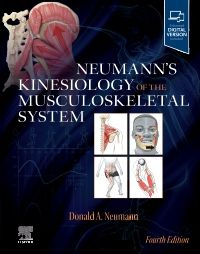Zařazeno v kategoriích: ZAHRANIČNÍ LITERATURA
Neumann’s Kinesiology of the Musculoskeletal System, 4th Edition
Donald A. Neumann
ISBN
9780323718592
EAN
9780323718592
**Selected for Doody’s Core Titles® 2024 in Physical Therapy**
With a focus on the normal and abnormal mechanical interactions between the muscles and joints of the body, Neumann’s Kinesiology of the Musculoskeletal System, 4th Edition provides a foundation for the practice of physical rehabilitation. This comprehensive, research-based core text explores kinesiology as it relates to physical rehabilitation in a clinically relevant and accessible manner. It presents the language of human movement — and acts as a bridge between basic science and clinical management. It helps clinicians effectively address the mechanical-based changes in movement across a person’s lifespan, whether in the context of rehabilitation, recreation, or promotion of health and wellness. Full-color anatomic and kinesiologic illustrations clearly demonstrate the anatomy, functional movement, and biomechanical principles underlying movement and posture. An eBook version, included with print purchase, provides access to all the text, figures, and references, with the ability to search, customize content, make notes and highlights, and have content read aloud. The eBook included with print purchase also features multiple excellent videos of anatomic and kinesiologic principles, answers to study questions from the print book, and additional tables and figures.
New to this edition
UPDATED! Current, evidence-based content closes the gap in kinesiology and anatomy science with clinical practice.
NEW! Additional Special Focus boxes and Clinical Connections boxes present kinesiology in a clinical context.
UPDATED! Modified artwork and new figures visually reinforce key concepts.
NEW! An eBook version, included with print purchase, provides access to all the text, figures, and references, with the ability to search, customize content, make notes and highlights, and have content read aloud. It also features videos, answers to study questions from the print book, and additional tables and figures.
Key Features
Evidence-based approach emphasizes the importance of research in PT decision-making.
More than 900 high-quality illustrations provide visual accompaniments to clarify the material.
Clinical Connections boxes at the end of each chapter highlight or expand upon a particular clinical concept associated with the kinesiology covered in the chapter.
Special Focus boxes throughout the text provide numerous clinical examples to demonstrate why kinesiologic information is needed.
Critical thinking questions for selected chapters reinforce the main concepts.
Author Information
By Donald A. Neumann, PT, Ph.D., FAPTA, Professor, Department of Physical Therapy and Exercise Science, College of Health Sciences, Marquette University, Milwaukee, WI
Ostatní s tímto titulem kupují:
-
Položka byla přidána do košíku.
























